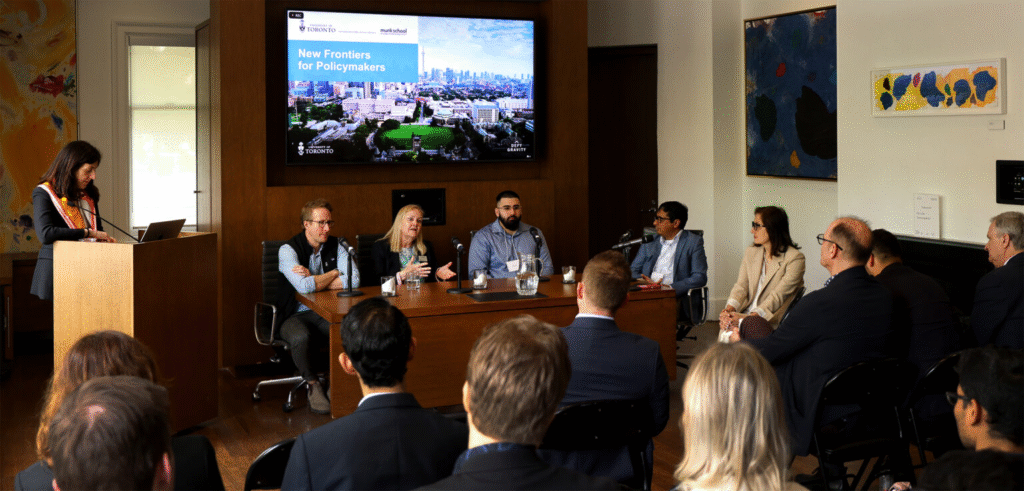Powering Ontario’s innovation economy through AI, Critical Minerals, and Energy

On May 14, 2025, the University of Toronto’s Munk School of Global Affairs & Public Policy, in collaboration with the Government Relations Office (GRO), hosted a policy-focused discussion showcasing how AI research and talent is strengthening Ontario’s critical minerals and energy sectors.
The event opened with a presentation by Professor Lesley Warren, Director of Mining Futures, at the Faculty of Applied Science & Engineering, who emphasized the foundational role of critical minerals in achieving Canada’s net-zero goals. She highlighted the importance of aligning academic research with industry priorities to support the development of a competitive, sustainable mining sector.
Professor Sebastian Goodfellow, followed with insights into how AI can modernize mining operations. He showcased technology developed by his startup, Kore Geosystems, which uses AI to automate the analysis of core samples – solving a key bottleneck in exploration and production. He spoke about the transformative potential of digital technologies and how the Department of Civil and Mineral Engineering (CivMin) is training future mining engineers to meet the sector’s evolving demands. “It was a privilege to participate in this event and showcase the groundbreaking AI technology we’re developing at Kore Geosystems for the mining industry,” he stated. “I also emphasized the pressing need to bridge the gap between fundamental academic research and commercialization, enabling innovative technologies to emerge and transform the sector—innovation that is essential to growing and strengthening the Canadian economy at this critical time.”
The session also featured Junid Ebadi from the Vector Institute, who spoke about the FastLane program, designed to support AI adoption for SMEs in Canada. The initiative helps ventures commercialize AI technologies and strengthens Canada’s position as a global AI leader through partnerships and economic development.
The FastLane program enables over 250 Canadian startups to accelerate their AI commercialization journey and compete more effectively in the global economy. It provides technology, professional development, IP education and AI benchmarking to assist startups. Through a partnership with NORCAT , mining technology clients will be able to access technical and strategic AI training to support the advancement of machine learning in the mining industry.
Energy innovation was another major focus. Shatha Qaqish-Clavering, Executive Director of Climate Positive Energy, and Shah Nawaz Ahmed of Siemens Canada discussed efforts to modernize the electrical grid. They highlighted U of T leadership in building a modern, secure, smart grid to support AI applications. The first of its kind in Canada, U of T’s Grid Modernization Centre will accelerate the integration of energy solutions into the grid, collaborating with stakeholders including Siemens to reflect the needs of an evolving smart grid for a decarbonized, decentralized, and digitized future.
They also discussed the power of AI for the grid of the future and the threat it carries in terms of cybersecurity attacks. The discussion also focused on power- hungry data centres and how they can be leveraged for economic benefits while minimizing the impact on the grid.
The event concluded with a Q&A panel discussion, where attendees explored themes such as commercialization, intellectual property, and strategies to attract R&D investment to Ontario. The speakers emphasized that collaboration across sectors is key to addressing infrastructure and policy challenges during the energy transition.
(Photo: L to R: Shari Eli, Prof. Sebastian Goodfellow, Prof. Lesley Warren, Shah Nawaz A. and Shatha Qaqish-Clavering during Q&A session at Munk School of Global Affairs & Public Policy, May 14, 2025 – photo and text by Galina Nikitina and Sayyeda Masood.)
Read a summary of the discussion:
